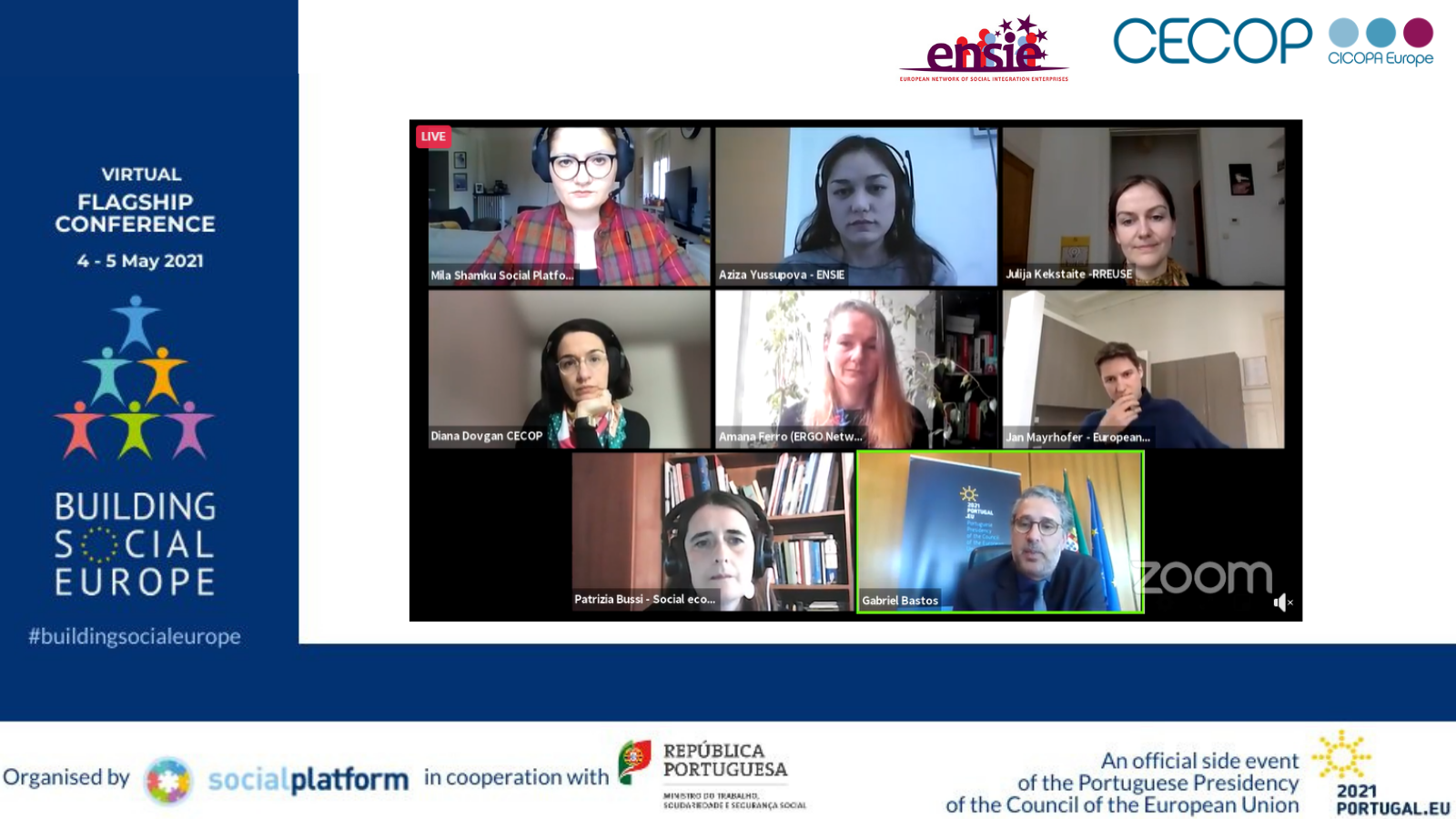
On the 4th of May 2021, the workshop ‘The Road to social Europe? An Action Plan for and with Europe’s Social Economy’ was organised by CECOP and ENSIE. It brought together different actors of the European Social Economy and beyond to discuss the main issues that the Social Economy Action Plan will need to deliver.
Gabriel Bastos, the Portuguese Secretary of State for Social Security gave a first intervention. He introduced the work of the Portuguese Council Presidency and reiterated the importance of the Action Plan to implement the European Pillar of Social Rights, strengthen the European Social model, and for the implementation of the twin green and digital transition. Furthermore, Mr Bastos discussed the potential of the Social Economy in fighting inequalities, creating jobs, providing general interest services, whilst being resilient to the current crisis. This speech was followed by a short intervention of Patrizia Bussi, Vice-President of Social Economy Europe, who outlined the position of Social Economy Europe on the Social Economy Action Plan. She reiterated that it is crucial to have a common understanding of the Social Economy across Europe, to raise the visibility of the Social Economy, and to ensure access to financial tools and markets.
After this insightful first exchange, the second part of the workshop was a panel debate moderated by Mila Shamku, Management Committee Member of the Social Platform. Aziza Yussupova, Policy Officer at ENSIE, introduced the work integration social enterprises in upskilling and including, socially and professionally, disadvantaged persons. For the Action Plan, she highlighted four main WISEs’ challenges related to the legislation, access to market, access to finance and representation in the European Semester process, which the Action Plan will need to address.
Focusing on the role of worker and social cooperatives, Diana Dovgan, Secretary General of CECOP, called for the Action Plan to include social economy actors in all sectors. The Social Economy Action Plan therefore cannot stand isolated, but other EU policies such as the Industry Strategy, the Skills Agenda, the SME strategy, and the Social Pillar Action plan, Ms Dovgan said.
Julija Kekstaite, Policy Officer at RREUSE, discussed the options of the Action Plan to support the establishment of a circular economy. She stated that the European Commission needs to mainstream support for the social and circular economy in all the EU policy tools and to raise awareness for the potential of the social and circular economy.
Taking a broader perspective, Jan Mayrhofer of the European Youth Forum, argued that the European Union will need to implement significant changes to its economic model. The aim of the Action Plan therefore cannot only be a strengthening of Social Europe, but economic system change.
The last panellist was Amana Ferro of ERGO Network, the European Roma Grassroots organization. She advocated for the Social Economy Action Plan to actively fight discrimination and racism against Roma. She said that the Action Plan must prioritise social goals over financial gains, as well as include specific support measures for Roma in Europe.
At the end of the workshop, the speakers and audience discussed their joint key recommendations for the Social Economy Action Plan, which then where send to the Social Platform:
- The Social Economy Action Plan must have a real impact on the support and promotion of the social economy, its actors and their alternative economic models. It should make strong links with the existing EU policies enabling green, fair and circular transitions in the post-COVID recovery. While embracing social economy enterprises active in all sectors of the economy, it should prioritise the social and professional inclusion of key groups, especially young people and ethnic minorities such as the Roma.
- The Social Economy Action Plan must ensure clear and supportive legal and enabling frameworks prioritising social goals and access to adequate funding, as well as encourage accessible education and training opportunities to achieve social justice and equality. For the adequate implementation of the Action Plan, public authorities at all levels (national, regional and local) should guarantee the active participation of all stakeholders. Finally, in order to provide an effective impetus for the social economy, the European Commission needs, in parallel to the Action Plan, to consider social economy enterprises, their specificities and needs in all policies and regulations (eg. Industry strategy, taxation, social policies etc).
You can watch the recording of the event here.







 Employment & Social Inclusion
Employment & Social Inclusion 

